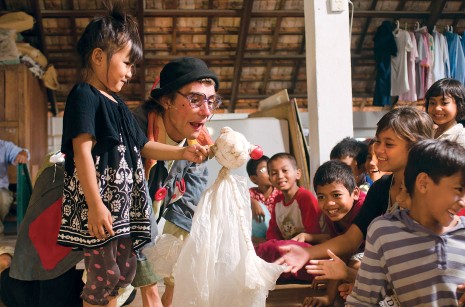Plastic bags, an inflatable globe, a few patchwork curtains, a flute and the obligatory red rubber nose—it doesn’t take much for Gauthier Jansen, who goes by the stage name Bolo the Clown, to make kids laugh.
In the dim and hot attic space of a temporary center for street children in Phnom Penh, run by local NGO Krousar Thmey, 34 kids aged between 5 and 14 had been waiting the whole day for Bolo.
They didn’t quite know what a clown was or what to expect, but Khieu Chetra, Krousar Thmey’s deputy coordinator of child welfare, said the children kept asking excitedly, “When is he coming, when will he arrive? We want to see the clown.” And as soon as Bolo entered the stage, their questions were self-explanatory: He makes people laugh.
“Laughter is the shortest distance between two people,” said Bolo, who travels the world as a member of Clowns Without Borders to entertain underprivileged children such as his audience at Krousar Thmey.
“I’m a theater actor in Belgium and play in front of an audience with 1,000 or 2,000 people. But here, my audience is so small—it’s usually between 30 and 40 children. I can look each of them in the eyes during the performance and see how they react, and they can also interact with me.”
Getting the children to participate is one of Bolo’s main goals. At the beginning of Monday’s performance, he propped himself up on his hands and knees, seeking help from a few boys who climbed on his back to hang quilted stage curtains, while he pretended to buckle under the weight. “I always try to bring them on the stage. It’s important for them because in a way I am saying, ‘I am an adult, but you are here on this stage with me, in the center’ and that makes the kids feel more important and gives them confidence.”
Bolo’s performance is what most would expect from a clown performing for children: Odd and over-the-top facial expressions, puppets (made simply of plastic bags), a little bit of slapstick and music as well as small magic tricks. It’s this basic but winning composition that enables him to perform all over the world—whether the Philippines, Tanzania, Burma, Kenya, Romania or Haiti. And a language barrier, Bolo said, doesn’t exist for clowns.
“I use simple emotions like happiness, sadness, anger and surprise, and they are the same everywhere in the world.”
Bolo spends about three months a year in his native Belgium and otherwise travels the world with Clowns Without Borders, a charity organization that pays for his trips. “But it’s cheap,” he said. “Staying here for six weeks, including the flight, only costs about $1,100. I travel light.”
This is the third time Bolo has come to Cambodia because, he said, out of the 14 countries he’s been to, Cambodia is his favorite. “There is something here… all the people can laugh about everything. In French, we call it la derision. It means that nothing is serious, but you actually just pretend, because it’s a way of making your life better.”
For Anne Guillaume, the communications officer of Krousar Thmey, Bolo’s shows are the perfect break from the norm.
“It’s important for the children to have different activities, but we need real stuff, something concrete, not just a foreigner who comes here because he wants to teach English for a month and then leave. A clown show is perfect—it makes so much more sense than most projects coming from abroad. Not every project from abroad works, but clowns are international, and we need something to make the kids laugh,” she said.
Kids need to get a chance to simply be children and forget, for a short time at least, about their hardships, she said.
“They need to forget and go away and dream.”
In Bolo’s audience was 14-year-old Thida, who ran away from her parents in search of a “better” life on the streets of Phnom Penh.
“A man found her in the middle of the night in Phnom Penh, sleeping on the street, and he brought her here,” said Krousar Thmey’s Mr. Chetra. “She lived in Poipet before and her family forced her to sell food on the street every day.”
But Thida wanted to go to school and play with friends in the afternoon. Running away from home seemed a good option. “This center is only temporary, and we always try to reintegrate the children in their families, if it’s possible. At the moment, she refuses, but we are talking to her family, and if she goes back, we will send someone there every month to check on her and see if she can go to school,” said Mr. Chetra.
The children, sitting on the attic floor to watch the show, seemed to be a bit startled and surprised at first by Bolo—dressed in baggy pants, a loose, half-tucked shirt, suspenders and a small black hat—who acted surprised himself about everything he did. But within minutes, what started as subdued chuckles turned into loud and boisterous laughter, opening Bolo up to perform with the children rather than just for them. By the show’s end, they were following him in a musical parade, clapping along and playing plastic bags as instruments as Bolo marched around the attic playing the flute.
After two hours, Bolo got into a tuk-tuk and left the still-glowing and smiling children who stood at the gate excitedly waving him goodbye. “I like that he showed us some tricks,” Thida said after the performance. “I loved the show, it was so much fun.”
